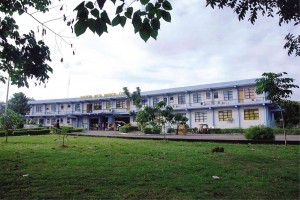(First of two parts)

EASTERN Bicol Medical Center in Virac, Catanduanes, is now suffering from a chronic lack of medicines and supplies, including oxygen, as its conversion into an economic enterprise four years ago failed to meet income projections. photo by Fernan Gianan
Employees of the financially distressed Eastern Bicol Medical Center (EBMC) in Virac town, Catanduanes province, are waging a long, legal campaign to force the provincial government to revoke an ordinance that converted the premier hospital into a hobbling business venture.
Last week, Judge Lelu P. Contreras of the Regional Trial Court rescheduled hearings on a civil suit filed by EBMC Employees Association after learning that its counsel had not yet received copies of counteraffidavits submitted by the respondents—Gov. Araceli Wong, Vice Gov. Jose Teves Jr. and members of the provincial board.
A petition, filed by association president Vicente Torno, Nanette Molina, Veronica Angeles, Jocelyn Madera, Juan Sicio, Naidah Shaheed Rendon, Gilda Taniegra, Yolanda Palino and Dr. Elmer Tatad in January, seeks a court issuance of a temporary restraining order (TRO) and preliminary injunction to stop the provincial government from enforcing the ordinance.
The court, however, denied the petition for a TRO, saying that the petitioners would not suffer any “irreparable injury” while it determines its decision.
Provincial Ordinance No. 001-2010 converted EBMC into a corporation owned and controlled by the provincial government. The hospital employees have assailed the law as “afflicted with patent invalidity and unconstitutionality” and cited procedural errors in its approval two years ago.
The proposal to convert EBMC into a profit-earning venture was submitted to the provincial board in January 2010 after then Gov. Joseph Cua sent a technical working group to La Union province for an on-site training orientation in “economic enterprise operation” at La Union Medical Center.
Heavily subsidized
With only one member, Shirley Abundo, dissenting, the provincial board approved the ordinance transforming EBMC into a corporation, removing it from the annual budget of the province and allowing its officials and employees to rely on income for salaries, allowances and other benefits.
Following the launching of the enterprise, fees for hospital services, including P50 for consultation and P150 for emergency room visit, were increased. The facility was also upgraded, offering 17 private air-conditioned rooms and 158 charity beds.
The measure provided for a yearly subsidy from 2010 to 2016, starting with P36 million on the first year to fill the gap between an estimated revenue of P38 million and the operational budget of P74 million. In the first year, an income of only P13 million was realized. The enterprise fared better by 2011, earning P34 million but still below the target of P43.5 million.
In 2012, the Commission on Audit (COA) recommended that the provincial government reconstitute the economic enterprise’s revenue projection to exclude provincial subsidy and called on the management to fast-track the implementation of a Revenue Enhancement Program to sustain its operations.
“If this cannot be realized, then the restoration of EBMC to its original status as a plain government hospital is likely the proper action to do,” the COA stated.
Unrealistic projections
The projected income was unrealistic as EBMC could not even meet the fund requirement for its own operating cost without provincial subsidy. In 2011, the hospital incurred expenses of P59 million and earned P67 million, with nearly half of the income derived from subsidy and the remainder, from PhilHealth reimbursements.
By May of 2013, the employees began to experience delays in their salaries and allowances due to insufficient funds for personal services. They harbored hope that their situation would change when Wong was sworn in as governor, but still, the late payment of salaries and deterioration in the delivery of health services continued.
EBMC administrative officer Estrella de Luna told the Inquirer that she had to beg the provincial treasurer’s office to release the funds for salaries. Likewise, she said the hospital had difficulty in raising money for the purchase of medicines, medical and laboratory supplies, oxygen and food for patients.
The hospital budget does not even provide for retirement funds, De Luna said.
DISGRUNTLED workers of Eastern Bicol Medical Center in Virac, Catanduanes, staged a protest march last January on their way to file a civil suit seeking to overturn the conversion of the provincial hospital into an economic enterprise three years earlier. photo by Fernan Gianan
Running out of patience, the employees filed a lawsuit. They cited minutes of the provincial board’s meeting to show that the proposed ordinance for an EBMC ecoenterprise did not go through the required three readings before it was put to a vote and that copies were not circulated for plenary debate in the second reading.
The board secretary, Ursus de Quiroz, reported that his office had not received any draft copy of the ordinance, as well as the committee reports, and minutes of the committee hearing and public hearing. Likewise, no feasibility study was conducted by the board as required by law—a finding underscored by the COA in its Audit Observation Memorandum in 2012.